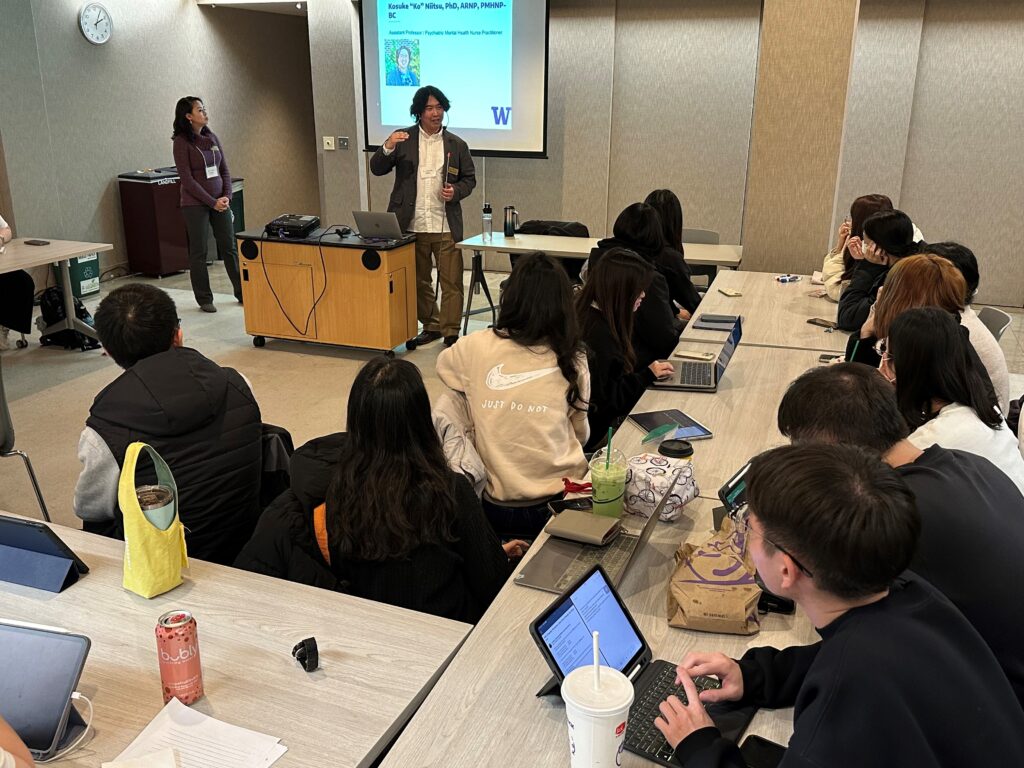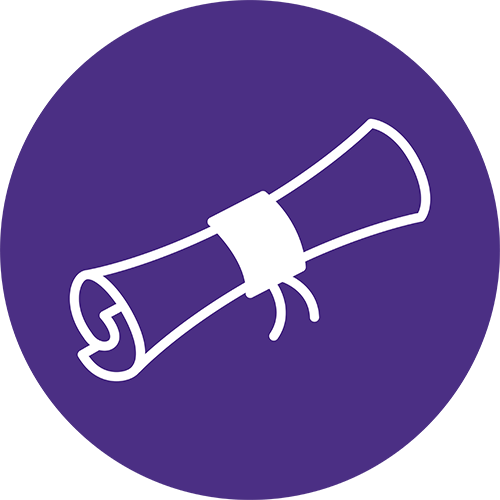Overview
The RN to BSN at UW Bothell provides a pathway for students who have earned an Associate Degree in Nursing (ADN) and want to advance their education and career by earning a Bachelor of Science in Nursing (BSN). Our program requires students to complete a Nursing program at a community or technical college and earn an Associate Degree in Nursing, which allows the student to take the NCLEX- RN Licensure exam.
If you are interested in learning more about the RN to BSN pathway to a Nursing career, please visit Become a Registered Nurse.
Curriculum
The curriculum is based on the American Association of Colleges of Nursing (AACN) Essentials of Baccalaureate Education for Professional Nursing Practice and the Commission on Collegiate Nursing Education (CCNE). One hundred practice hours are embedded in the curriculum. The program is focused on:
- evidence-based practice and nursing inquiry;
- cultural and social issues in health care;
- legal and ethical issues in clinical practice;
- and relational leadership in nursing.
Review the course descriptions to learn more.

Locations
The Program is offered at Bothell, Shoreline, and Everett.
| Entry | Location | In-person Meeting Day |
|---|---|---|
| Qtr: Autumn late September | Bothell | Thursdays |
| Qtr: Autumn late September | Shoreline Community College | Fridays |
| Qtr: Winter January | Everett University Center | Tuesdays |
Schedule
The RN to BSN program is designed to be completed in four (4) or eight (8) quarters. The four (4) quarter program is considered the full-time track and the eight (8) quarter program is the part-time track.
The nursing courses meet one day every other week from approximately 8:00-5:30 pm. Two required Health coursework may meet online or as a hybrid, meeting in-person one (1) to three (3) times in a quarter from 5:45 – 9:00 pm.
The program also includes a Community Health fieldwork course which requires practice hours outside the classroom and travel within the region. The fieldwork course is not offered in a hybrid modality and students are required to be available every week (10 in-person/on-site sessions).
Full-time schedule
- 4 quarters, one year to graduation
- 10 – 15 credits a quarter
- Coursework meets in hybrid modality,
5 times in person - Fieldwork requires weekly in-person meetings
Part-time schedule
- 8 quarters, two years to graduation
- 5 credits a quarter – one quarter 10 credits
- Coursework meets in a hybrid modality,
5 times in person - Fieldwork requires weekly in-person meetings
Schedule with in-person dates

2024-2025 ACADEMIC SCHOOL YEAR
Download a copy of the in-person schedule with the course information.
Cost of attendance
Explore the cost of attendance and related university and program fees. If you are a Washington State or a UW employee, review the Tuition Exemption Program.

Many funding opportunities are available for students. To be considered for all types of financial aid, U.S. students must submit the
Free Application for Federal Student Aid (FAFSA).
For undocumented students living in Washington, please use the Washington Application for State Financial Aid (WASFA). International students in the U.S. with an F-1 visa or any other type of non-immigrant visa are not eligible for financial aid. The Nursing Scholarship handout has information on external scholarships available.
Tuition
These figures are for informational purposes only for the most up-to-date figures, please refer to the tuition website.
The University considers full-time enrollment, 10 – 18 credits a quarter.
| 2024-2025 | Washington State Resident | Non-Washington State Resident |
|---|---|---|
| Autumn | $4,307.00* | $14,385.00* |
| Winter | $4,306.00 | $14,385.00 |
| Spring | $4,306.00 | $14,385.00 |
| Summer | $4,264.00 | $14,343.00 |
| Total Tuition & Fees | $17,183.00 | $57,498.00 |
*Does not include a one-time $330.00 new student enrollment and orientation fee.
Nursing program fees
- Health and Safety Requirements and Background Check Fee.
Admitted applicants complete a background check which has a fee of $54.00 and must purchase a
Health and Safety Package fee of $64.99.
- Course Fees. If there is a course fee, it will be noted in the course description.
- BNURS 424 Community Health Nursing, has a $75.00 course fee.
| Background Check | $54.00 |
Health & Safety Package | $64.99 |
| Estimated Cost of Books | $300.00 – $500.00 |
| Background Check Renewal | $16.00 |
UW Tri-Campus BSN goals
- Integrate concepts and ways of knowing from the arts and sciences in promoting health and managing nursing care across the wellness-illness continuum.
- Demonstrate value-based professional behaviors that integrate empathy, autonomy, integrity, social justice, and equity as well as respect for diversity and inclusion, human rights, and human dignity through cultivating partnerships with patients, families, and communities.
- Deliver and advocate for health equity through health promotion, care coordination and disease prevention strategies at the individual, family, community, and population levels.
- Apply leadership concepts, skills, and decision-making in the provision and oversight of nursing practice in a variety of settings.
- Appraise, critically summarize and translate current evidence into nursing practice.
- Demonstrate integration of nursing scholarship, critical thinking, clinical decision-making, and psychomotor skills necessary for the delivery of competent, safe, evidence-based, holistic, compassionate and high-quality care to individuals, families, communities and populations across the lifespan.
- Translate principles of safety and quality improvement into the delivery of high-quality care to individuals, families, communities, and populations.
- Utilize information, communication, and patient care technology tools to facilitate clinical decision-making and the delivery of safe, effective and high-quality nursing care.
- Demonstrate effective professional communication and collaboration within and across disciplines and with the public to optimize health outcomes.
- Demonstrate an understanding of how health policy, economic, legal, political, and socio-cultural factors influence the delivery of and advocacy for equitable health care.
- Demonstrate critical interrogation of positionality, recognition of implicit biases, as well as knowledge and application of anti-racism principles to promote health equity.
Philosophy of undergraduate education
The Nursing faculty believes that the purpose of university-based undergraduate healthcare education is to prepare healthcare professionals whose practice is informed by theory and research. The philosophy of the undergraduate curriculum is rooted in values of excellence, diversity, community, social justice, integrity, and creativity. Preparation for the various roles in practice requires knowledge of the arts, sciences, and humanities, together with content and processes specific to the discipline. An interdisciplinary emphasis engages students in a broad range of ideas and knowledge. Ultimately, professional nursing requires a commitment to scholarly inquiry, social equity, advocacy, and life-long learning.
The members of the faculty believe that their teaching styles need to take into account the diverse nature of how students learn. We are a community of learners and scholars — a community that is created in collaboration with students.
The curriculum focuses on critical thinking and analysis, communication, and diversity. The baccalaureate degree enables a nurse to assume a leadership role and practice from an evidence base. Graduates collaborate with transdisciplinary teams in complex organizational systems to improve health care access, cost, and quality. The curriculum prepares graduates to competently work in partnership with individuals, families, communities, and populations to promote health locally and globally.
Accreditation
The baccalaureate degree program in nursing at the University of Washington Bothell is accredited by the Commission on Collegiate Nursing Education, 655 K Street NW, Suite 750, Washington, DC 20001,
202-887-6791 (http://www.ccneaccreditation.org).
Opportunities in Seattle
The University of Washington Seattle offers a BSN and an Accelerated BSN program (for those holding a Bachelors degree in another field). If you would like to learn more about their programs, call 206-543-8736 or
e-mail asknursing@uw.edu.
